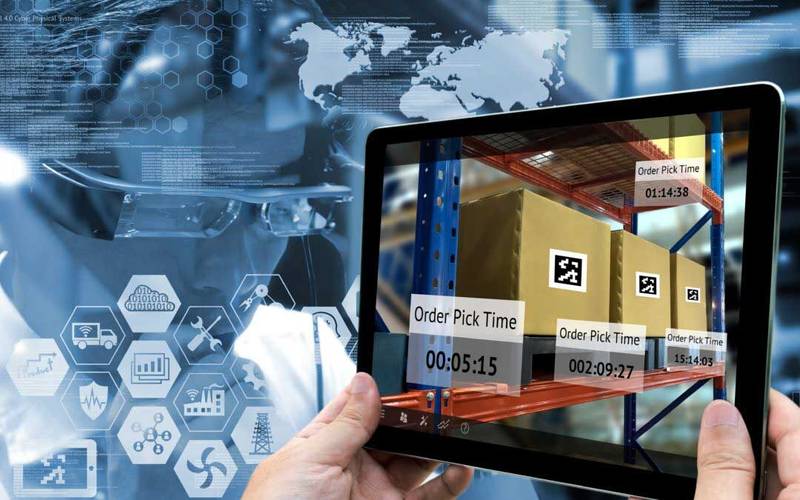What is a Warehouse Management System and Why do You Need It?
By Santosh Kumar | October 8, 2020 | Software Development

A Warehouse Management System, or WMS, is software with processes that enable organizations to administer and manage warehouse operations. The primary operations in a warehouse include managing inventory, taking up processes and auditing. WMS can be the helping hand for businesses to take care of all these operations from the moment goods enter a warehouse until they are shipped.
To get a clearer understanding, consider an example, a WMS provides you with the visibility into your inventory at any time and from any location. Additionally, it helps manage supply chain operations from the wholesaler to the warehouse, and then to the distribution centre or retailer.
In case you are looking for something similar to manage your warehouse or inventory, you should know about the different types of WMS to choose. We have got you a detailed explanation of the three main types of the warehouse management system.
Types of Warehouse Management Systems
Standalone WMS
Standalone WMS is the most basic WMS type that is known for its warehouse management features. You can combine it with your existing or future solutions. However, it is sold as a unique product without any supply chain functions.
Standalone systems have got only the most significant features of a potential WMS module. It typically incorporates warehouse operations and inventory management. On using a standalone WMS, you will get features like barcode scanning, expiration date tracking, cycle counting, receiving, slotting putaway, picking, packaging, and shipping.
This type is a suitable option for small-to-medium-sized businesses (SMBs) that have a tight budget. It doesn’t cover the logistics and integrated features, which you can find in other types of WMSs.
Supply Chain Modules
Supply chain modules can be considered as the type of WMS system that is a subcategory of SCM (Supply Chain Management). SCM software ranges to a broader scope of features – from managing vendor relationships to business administrations to risk management. Its main aim is to automate tasks like inventory management, product cycles and material sourcing.
When you invest in this WMS type, you also need to put your money in supply chain planning applications offering warehousing features. Combining your WMS with other applications is believed to be a good option ensuring paramount cohesion between different sections of your business. Supply chain modules act as a holistic approach to management as it includes both warehouse features and supply chain, whereas standalone deals only in the former.
Integrated with ERP
ERP is a leading software solution that comes with all the core applications crucial for successful 3PL processes. From supply chain planning, customer relationship management, to accounting and human resources, it incorporates everything you need for warehouse and inventory management.
So, if you are looking forward to upgrading your software solutions, integrated ERP systems are the best option. You will get a perfect edge of your peers and space to boost your ROI. They offer massive supply chain execution, scalability and warehouse management features. However, managing warehouses is not the core feature of ERP.
WMS as integration with ERP and as a supply chain module are largely different from the basic standalone systems. The call is yours if you want a specialized WMS or benefit of the combined software product. Make a wise decision based on your business size and long-term goals.

An effective WMS can support in improving inventory accuracy, and ultimately leading to faster inventory turnover.
At first, you might think WMS to be an expensive and complicated system to implement and run, but not after you know what all benefits it has to offer you.
Check out how having a WMS can help you in the long run:
Improved inventory accuracy
With a custom-built WMS for your business, you can control your inventory better – from receiving to shipping. When you don’t have a proper understanding of your inventory, you face problems like carrying excess stock that sometimes results in reduced cash flow. Or, you might be running out of stock but with no idea of the inventory status until a bulk order is placed.
An effective WMS can support in improving inventory accuracy, and ultimately leading to faster inventory turnover.
Reduced labor costs
When you have everything sorted through a unique WMS system, you will need minimum manpower in the warehouse. Investing in a WMS system will reduce your labor costs as you will need only a few hands to manage the system and operations. Moreover, you will also have a proper way to utilize warehouse space.
Better customer service
A WMS allows you to reduce inventory paperwork like reports, move tickets, pick tickets, packing lists, etc. With a WMS, you can have all this done electronically. The software solution is the key to streamlining all kinds of processes like order to delivery and availability of goods more accurately. The systematic functioning makes it possible to give the customers more realistic dates, thus, minimizing customer complaints and improving service.
Minimum errors in picking and shipping goods
When you have everything managed electronically, and all the data is available through a proper system, there are minimum chances of errors in picking and shipping goods.
Some other benefits of using a warehouse management system are more flexibility and responsiveness, boost in employee morale, and better stock handling.
To Sum Up
For any business that deals in 3PL (third-party logistics), WMS software is a crucial element for successful management of the goods or materials. Suppose you have got a business that needs warehouse or inventory management, Tectra Technologies can provide you with the perfect solution by developing a custom-built and well-planned WMS for you.

